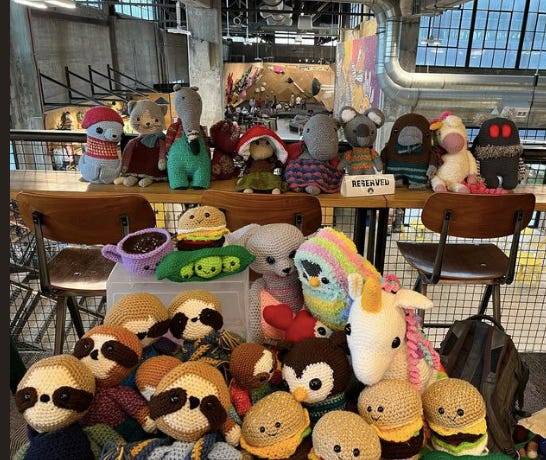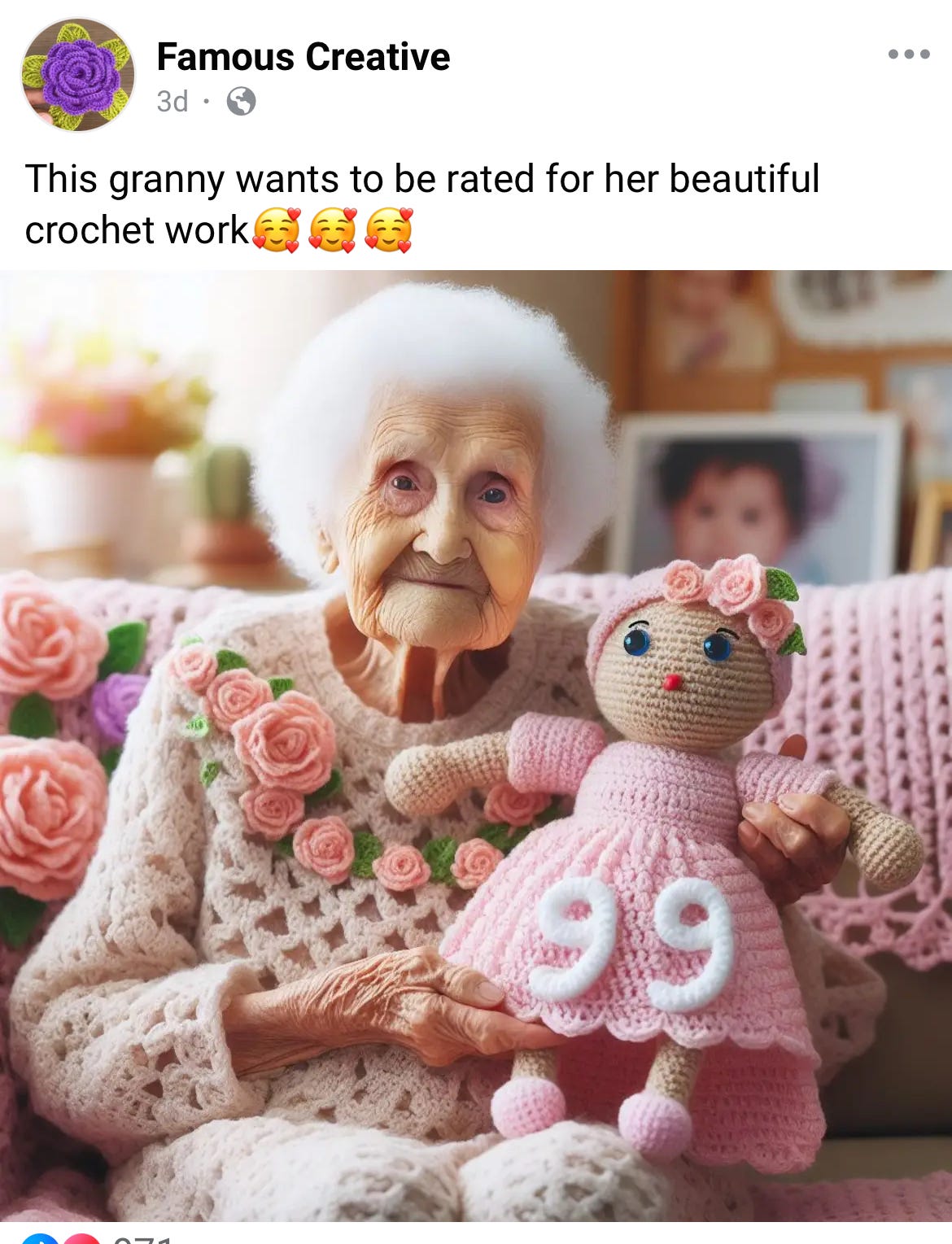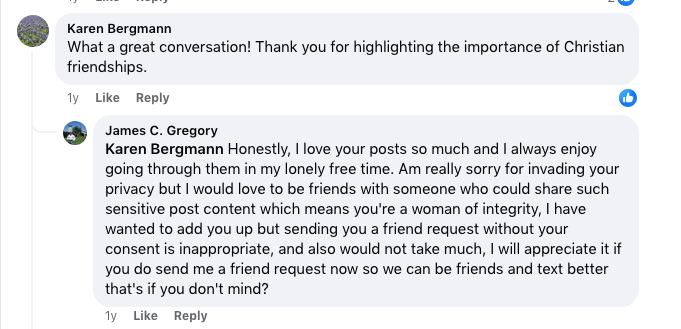When you spend enough time with a crochet hook in your hand, you know what a single stitch looks like. But AI doesn’t.
Some of you guys may not know that I’m a big fan of crochet. I crochet all the time. I love to make dolls and stuffed animals and send them off to their new homes.
So when I say that the crochet world is out of whack right now, I promise I’m telling the truth.
Above you’ll see some real, bona fide, genuine crochet, made by me. But if you get on Etsy right now, you will see dozens, and dozens, of crochet patterns that just… don’t look quite right.
If you get on crochet Facebook groups, you’ll hear from people who tried to crochet from a pattern that came from an AI image, and realize they got duped.
And then if you get on Facebook and start looking at crochet pages, you’ll start to see…
Well.
Well, you’ll start to see… um, some really messed up stuff.
Guys, AI Facebook pages of fake cakes, fake fiber arts, fake decorating, and fake baby photos are the front of a massive scam front. It is deliberately targeting older women who are not able to spot the difference between a real and fake photograph, and using them as a revenue source for scams.
So, I’ll be honest with you. At first, I thought this was the scam, which I had seen reported on multiple crochet message boards — crochet scams that existed to scam other crocheters. Someone would post some too-perfect picture of a crochet pattern that couldn’t possibly exist — which you might not know if you were new to the craft, or didn’t realize AI was a thing that could infiltrate online spaces. Then, people would try to buy the pattern or the product. Then, they would realize the pattern didn’t work, or the item would never arrive. Then they would realize they’d been scammed.
But then I started scrolling around on crochet facebook pages, and I regret to tell you, things got way darker. Much, much darker.
It’s not about scamming other crocheters. It’s about scamming everyone.
Guys, AI Facebook pages of fake cakes, fake fiber arts, fake decorating, and fake baby photos are the front of a massive scam front. It is deliberately targeting older women who are not able to spot the difference between a real and fake photograph, and using them as a revenue source for scams.
I started to suspect this when I realized how often on these boards, people would reply to grannies with links, invitations to chat, and other bizarre things. So I decided to get to the bottom of it.
I made a Facebook profile with apologies to Alice Munro, and disguised myself as a sweet granny.
And then I started acting like the most gullible person in the universe, behaving as though I believed all these freakshow patterns were real.
A few people tried to stop me.
Here’s what I found.
Malware
This one is pretty straightforward. A Facebook site posts multiple fake photos of people making cakes, decorating, crocheting, or simply being in the military, usually with some request for birthday wishes.
Then, when people (usually older folks) wish them well, someone responds to a link to Profitablegate CPM. So what’s that?
I obviously didn’t click on the link to get to the bottom of this, but what I was able to find by googling around is that Profitablegate CPM is a website that is associated with multiple phishing scams. Phishing happens when a website tries to disguise itself as a legitimate website, then asks for your computer passwords, credit card info, or social security number. Apparently, a number of websites associated with Profitablegate run this scam to steal people’s credit card info.
But wait, there’s more! This particular website puts malware or a browser extension on your computer to regularly redirect your browser to a website to unwanted ads to generate revenue.
It seems the way this scam particularly works is by forcing your computer to constantly redirect to advertisements so that the ad company can earn more revenue with more clickthroughs. If the virus does more than that, I don’t know about it, but this sounds like a pain in the neck in itself. Don’t click links to this website. I didn’t.
The Romance Scam
A romance scam is when a scammer connects with an individual, usually older and widowed, and sweet talks them into a relationship. Then, after the target feels in love with the scammer, they start to ask for money, or start to pose as a victim of a nefarious plot — which, with a few dollars more, will end with astonishing riches for the target and their lover, who will end up together in the end. It’s particularly common for romance scammers to pose as a member of the U.S. military.
And what do you know? Veterans, and other lovesick seniors, are all over crochet pages on Facebook.
Okay, so here’s where things get weird.
So this very unusual phrasing shows up in the mouths of a lot of people on Facebook, like this deeply religious construction worker Titus Cornelius (hitting on religious man David Daniels), who joined Facebook on February 21 of 2024.
It even shows up in the mouth of General Paul LeCamera reacting to the death of OJ Simpson (more on him in a minute):
And there’s also Frank Clinton, who’s also in the military, and is also single!
And he’s not just single, he’s all over Facebook looking for love!
Now, here’s where things get extremely bizarre. I can’t find photos of the other men whose photos I’ve posted who I suspect are fronts for scammers. But I could find a photo of “Frank Clinton,” because that’s not Frank Clinton. There is no Frank Clinton. That’s Major General Eric Hill, who is married with two children. I’m not the first person to notice this. I tried to reach out to Major General Hill to ask if he was aware of this and found that I was slow to the punch. Apparently Major General Hill’s face is a popular face with scammers who try to bait women into romance scams. He says he does not know why he is such a favorite with scammers. (I think it’s obviously because he’s handsome, but I will leave that to the audience.)
And then this lothario over here is Lieutenant General Jonathan Braga, who is actually married with five children.
It didn’t take long until men in uniform started hitting on my poor Agnes Munro, too. Specifically, by Paul LaCamera.
My dark seducer, as you can see, was General Paul LaCamera, who is not the real General Paul LaCamera. Paul LaCamera, you see, doesn’t have a Facebook page of his own:
Which I told “Paul LaCamera.”
(Haven’t heard back from him.)
And, of course, it will not surprise you to know that “General LaCamera’s” pick-up line is not a particularly original one (thought “Paul” uses more emojis).
And what do you know, turns out James here is another Army widow.
Except he’s not.
He’s actually Master Sergeant Stuart James.
Who is also sick of being the face of frauds.
So, to make a very long story short:
People post patterns of fake crochet
People who are interested in crochet (overwhelmingly, older women) comment on the photos)
Scammers then reply with malware to redirect those commenters’ browsers to ad revenue sites OR
Those commenters get targeted for military-flavored romance scams.
Do you see what I mean when I say this got dark?
Well, That’s Messed Up. Now What?
Honestly, I don’t know.
AI is truly terrifying for most professors, who are seeing students consistently depend on AI for essay writing and basically eschew the learning process. The political ramifications for the production of propaganda are terrifying. And AI has become a battlefield for the creative class, most recently in the WGA and SAG strikes of 2022.
But right now, my concerns are closer to home. I love crochet. I love my art. And I hate that it’s being weaponized.
So right now, this is really all I can say:
Talk to your parents about AI. Tell them about the proliferation of scams on Facebook. Talk to them about romance scams. These are pervasive and disastrous, and people are often afraid to come forward when they suspect they have been scammed.
If you have a family member who crochets or is interested in fiber arts, talk to them about how to spot fake designs. I have my own guide here, but it’s pretty crochet-specific. Encourage them to avoid with interacting with people on social media they don’t know, and ask if you can scroll social media with them to spot the difference between real and fake.
Because this is coming for all of us, and it’s darker and more alarming than it looks. Please be aware. Please talk to your friends and family, because they’re falling for deep fakes in the presidential campaign. Right now, it starts with a single stitch. But it can end in disaster.





























This was a useful reminder to me that for people who aren't as familiar with the internet and the like as I am (having grown up with it), that telling the difference between AI and real stuff isn't as easy